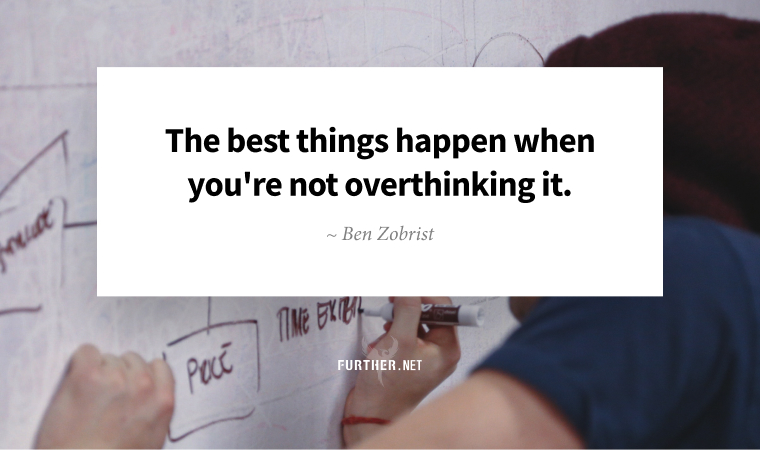
Your brain is powerful, which is why it’s often compared to a supercomputer. This implies it instantly accurately processes information to determine ideal outcomes.
Now, think about what you put into even a simple decision like what’s for dinner. That easily takes me a half-hour to consider who I’m feeding, what’s in the fridge, what we’re not sick of, and so on.
Back to that computer comparison. Your brain runs on an antiquated default operating system with primal neurological wiring designed to keep you “safe.” Add in a lifetime of social conditioning, and overanalyzing becomes natural.
However, it’s not necessarily inevitable. From meditators to the military, there are tricks of the trade to gain agency over your thoughts and actions.
This Indecision’s Bugging Me
While there’s nothing wrong with being analytical, there’s a fine line between assessing a situation and overthinking it. Studies show excessive rumination can lead to depression and anxiety.
Breaking a habit of second-guessing and obsessive thinking starts with learning how to trust your gut.
The gut, literally, contains many of the same neurotransmitters as the brain; in fact, there are two neural pathways going from the gut to the brain (and only one going the other way). The gut sends information to the brain and you can use gut and intuition to filter the decisions that you send up to the brain for processing. So, rather than analyzing 100 possibilities, you narrow it down to one or two, and analyze those.
In other words, instinctual decision-making comes naturally. Using it wisely is a skill you can cultivate.
Fight the Overthinking Urge
One way to manage your mental state is through meditation. By quieting your mind, you release limiting negative thought patterns and gain focus and awareness. This makes the next right action accessible and clear.
While a gradual, meditative approach works for some, others may prefer a mental shortcut like an OODA Loop. Created by US Air Force Colonel John Boyd, it’s a four-part process that removes fear from ambiguity and uncertainty and expedites decision-making.
- Observe: Quickly take in your environment, relevant information, and cues. Ignore anything unrelated.
- Orient: Identify barriers to progress, including cognitive biases and shortcuts, to see reality clearly.
- Decide: At this point, there are no surprises. You have what’s necessary to make an informed decision.
- Act: Take action by testing your decision out. Remember, it’s all about progress, not perfection.
And repeat — that’s the loop part. You don’t have to be pressured like a fighter pilot to use Boyd’s heuristic. It applies to any situation (even deciding what’s for dinner) by prioritizing decisiveness, initiative-taking, and autonomy.
OODA Loop or Om, pick what appeals to you. Either way works; so don’t overthink it.
The OODA Loop: How Fighter Pilots Make Fast and Accurate Decisions (Farnam Street)
Overthinking is the bane of decision-making. This how to cut back on constantly analyzing things (Fast Company)
